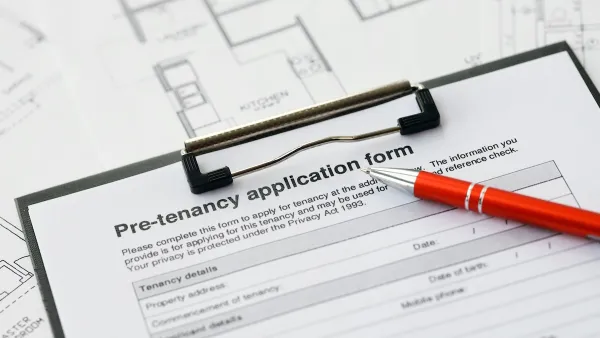Formerly incarcerated people are often barred from publicly subsidized housing, putting them at higher risk for homelessness and recidivism.

The U.S. Department of Housing and Urban Development (HUD) is taking aim at housing discrimination against formerly incarcerated people, reports Eleanor J. Bader for Truthout.
The article describes the history of the ‘one-strike rule’ that kept people with criminal records out of public housing and new efforts being made by state and federal authorities to limit discrimination in publicly subsidized housing. “The state of New Jersey and a small number of cities have passed Fair Chance for Housing laws to limit what landlords can ask prospective tenants and restrict how far back they can go in someone’s personal history.” A New York City law limiting how far landlords can search a criminal record and when they can conduct background checks will apply to both public and private multi-family housing.
“In addition, the federal Department of Housing and Urban Development (HUD) has proposed regulations for public and HUD-supported housing and to protect those at risk of eviction following the arrest and conviction of a household member.” HUD’s newly proposed rule would require public housing authorities (PHAs) to “consider mitigating circumstances” and factors beyond a criminal record to make the process more fair and equitable.
As Bader notes, “Tenants and advocates know that the HUD regs, as proposed, are only a small step toward housing justice, which will also require massive outlays of money for the construction or renovation of units that are truly affordable to low- and moderate-income people. At the same time, they know that even tiny changes can help.”
FULL STORY: HUD Targets Public Housing Discrimination Against Formerly Incarcerated People

Planetizen Federal Action Tracker
A weekly monitor of how Trump’s orders and actions are impacting planners and planning in America.

Map: Where Senate Republicans Want to Sell Your Public Lands
For public land advocates, the Senate Republicans’ proposal to sell millions of acres of public land in the West is “the biggest fight of their careers.”

Restaurant Patios Were a Pandemic Win — Why Were They so Hard to Keep?
Social distancing requirements and changes in travel patterns prompted cities to pilot new uses for street and sidewalk space. Then it got complicated.

Platform Pilsner: Vancouver Transit Agency Releases... a Beer?
TransLink will receive a portion of every sale of the four-pack.

Toronto Weighs Cheaper Transit, Parking Hikes for Major Events
Special event rates would take effect during large festivals, sports games and concerts to ‘discourage driving, manage congestion and free up space for transit.”

Berlin to Consider Car-Free Zone Larger Than Manhattan
The area bound by the 22-mile Ringbahn would still allow 12 uses of a private automobile per year per person, and several other exemptions.
Urban Design for Planners 1: Software Tools
This six-course series explores essential urban design concepts using open source software and equips planners with the tools they need to participate fully in the urban design process.
Planning for Universal Design
Learn the tools for implementing Universal Design in planning regulations.
Heyer Gruel & Associates PA
JM Goldson LLC
Custer County Colorado
City of Camden Redevelopment Agency
City of Astoria
Transportation Research & Education Center (TREC) at Portland State University
Camden Redevelopment Agency
City of Claremont
Municipality of Princeton (NJ)





























